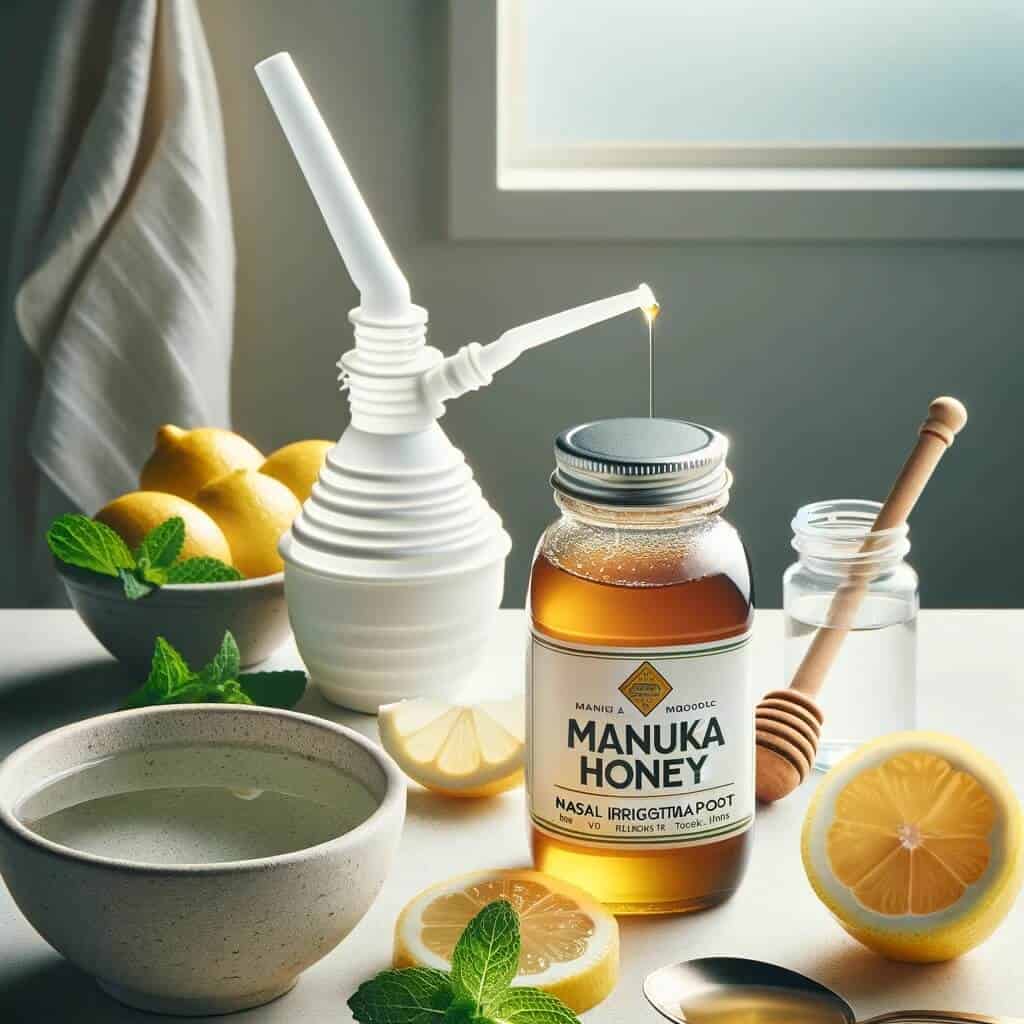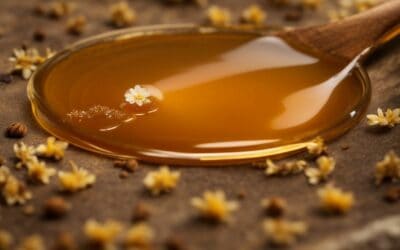Are sinus infections constantly bothering you? You’re not alone. Sinusitis, or sinus infection, affects millions of people worldwide and can be a chronic and painful condition.
But there is hope! In this article, we will explore the amazing benefits of Manuka honey for treating sinus infections and how it can provide relief for you.
What Are The Benefits Of Manuka Honey For Sinus Infections?
Manuka honey has been known for its numerous health benefits, including its ability to fight sinus infections. In this section, we will explore the specific benefits of using manuka honey for sinus infections.
From its powerful antibacterial properties to its ability to reduce inflammation, manuka honey offers a natural and effective solution for those suffering from sinus issues.
Additionally, we will discuss how manuka honey can soothe and alleviate the irritation caused by sinus infections.
1. Antibacterial Properties
Manuka honey is well-known for its potent antibacterial properties, making it a beneficial remedy for sinus infections. Here are some steps to follow when utilizing manuka honey for treating sinus infections:
- Nasal irrigation: Dilute manuka honey with saline solution and use a neti pot or nasal spray to cleanse the sinuses.
- Honey water mixture: Mix manuka honey with warm water and drink it to promote antibacterial effects throughout the body.
- Honey steam inhalation: Add a spoonful of manuka honey to steaming water, cover your head with a towel, and inhale the steam to soothe and clear the sinuses.
When using manuka honey for sinus infections, it’s essential to consider precautions such as potential allergies, high sugar content, and interactions with medications. If symptoms persist or worsen, it’s advisable to consult a doctor.
Manuka honey is a natural and effective option for managing sinus infections.
2. Anti-inflammatory Properties
Manuka honey has anti-inflammatory properties that can be beneficial in relieving sinus infections. Here are some ways to incorporate it into your sinus care routine:
- Nasal irrigation: Create a mixture of warm water and a teaspoon of manuka honey, and use a neti pot or nasal spray to flush out your sinuses.
- Honey water mixture: Mix a teaspoon of manuka honey with a glass of warm water and drink it to help soothe inflammation in your sinuses.
- Honey steam inhalation: Add a tablespoon of manuka honey to a bowl of hot water, cover your head with a towel, and inhale the steam to reduce inflammation.
However, it’s important to be cautious when using manuka honey as it may cause allergies, has a high sugar content, and may interact with certain medications.
If your symptoms persist, it’s crucial to seek medical advice for proper diagnosis and treatment.
3. Soothes Irritated Sinuses
Soothing irritated sinuses can provide relief from symptoms such as congestion and inflammation. Here are steps to utilize Manuka honey for this purpose:
- Prepare a saline solution by mixing 1/4 teaspoon of salt with 8 ounces of warm water.
- Using a neti pot or nasal irrigation bottle, pour the saline solution into one nostril while tilting your head to the side.
- Allow the solution to flow through your nasal passages and drain out the other nostril.
- Repeat on the other side.
The antibacterial and anti-inflammatory properties of Manuka honey can help soothe irritated sinuses and support healing. However, if symptoms persist or worsen, it is important to consult a doctor.
How To Use Manuka Honey For Sinus Infections?
Sinus infections can be a pesky and uncomfortable ailment, but luckily, manuka honey has been known to provide relief. In this section, we will discuss three methods on how to use manuka honey for sinus infections.
From nasal irrigation to honey steam inhalation, these techniques have been proven to alleviate symptoms and promote healing. So, let’s dive into the specifics of each method and discover the power of manuka honey in treating sinus infections.
1. Nasal Irrigation
Nasal irrigation is a beneficial technique for relieving sinus infections using manuka honey. To perform nasal irrigation, follow these steps:
- Create a saline solution by dissolving ¼ teaspoon of salt in 8 ounces of warm water.
- Add 1 teaspoon of manuka honey to the saline solution.
- Tilt your head to the side and pour the solution into one nostril using a neti pot or bulb syringe. Allow it to flow out through the other nostril.
- Remove any excess solution by gently blowing your nose.
- Repeat the process with the other nostril.
Nasal irrigation with manuka honey can help reduce congestion, moisturize the nasal passages, and promote healing. However, it is important to consult a doctor before attempting this method, especially if you have any underlying medical conditions or allergies.
2. Honey Water Mixture
To create a honey water mixture for sinus infections, follow these steps:
- Mix warm water with a teaspoon of high-grade Manuka honey.
- Stir the mixture until the honey is completely dissolved.
- Use a neti pot or nasal spray bottle to apply the honey water mixture to the nasal passages.
- Gently tilt your head and allow the mixture to flow through one nostril and out the other.
- Repeat on the other side.
The use of honey for medicinal purposes dates back thousands of years. Ancient Egyptians, Greeks, and Romans recognized its healing properties and used it to treat various ailments, including sinus infections.
Incorporating high-grade Manuka honey into a honey water mixture enhances its effectiveness due to the unique properties of Manuka honey.
3. Honey Steam Inhalation
Honey steam inhalation is a natural remedy that can help alleviate sinus infections. Here is a step-by-step guide to performing Honey Steam Inhalation:
- Boil a pot of water and remove it from heat.
- Add 1-2 tablespoons of Manuka Honey to the hot water.
- Place a towel over your head and lean over the pot, creating a tent to trap the steam.
- Inhale the steam for about 10-15 minutes, taking deep breaths.
- Repeat this process 2-3 times a day for relief from sinus congestion.
Pro-tip: For added benefits, you can add a few drops of essential oils like Eucalyptus or Tea Tree Oil to the water before inhaling the steam.
What Are The Precautions When Using Manuka Honey For Sinus Infections?
While manuka honey has been proven to be effective in treating sinus infections, it is important to take certain precautions before using it.
In this section, we will discuss three important precautions to keep in mind when using manuka honey for sinus infections.
These include potential allergies, the high sugar content of the honey, and any interactions it may have with medications.
By being aware of these precautions, you can ensure the safe and effective use of manuka honey for sinus infections.
1. Allergies
Allergies can be a concern when using Manuka honey for sinus infections.
- Consult an allergist: If you have known allergies, it’s important to consult an allergist before using Manuka honey to ensure it won’t trigger any adverse reactions.
- Patch test: Before applying Manuka honey topically or consuming it, perform a patch test on a small area of skin to check for any allergic reactions.
- Start with small amounts: If you’re using Manuka honey for the first time, start with small amounts to gauge your body’s response and monitor for any allergic symptoms such as hives, itching, or difficulty breathing.
- Discontinue use if any allergic reactions occur: If you experience any allergic reactions, such as swelling, rash, or difficulty breathing, discontinue the use of Manuka honey and seek medical attention.
2. High Sugar Content
High sugar content is a valid concern when using Manuka honey for sinus infections. It is crucial to be mindful of the amount of sugar consumed, especially for individuals with diabetes or those watching their sugar intake.
To minimize the impact of high sugar content, consider the following steps:
- Limit portion size: Use small amounts of Manuka honey to avoid excessive sugar intake.
- Pair with low-sugar options: Mix Manuka honey with other ingredients like lemon juice or warm water to dilute the sugar content.
- Monitor blood sugar levels: If you have diabetes, closely monitor your blood sugar levels when using Manuka honey.
- Consult a healthcare professional: If you have concerns about the high sugar content of Manuka honey, seek guidance from a healthcare professional for personalized advice.
3. Interactions With Medications
When using Manuka honey for sinus infections, it is important to be cautious about potential interactions with medications. Here are some steps to follow and precautions to consider:
- Consult your healthcare provider: Before using Manuka honey alongside your medications, discuss with your doctor or pharmacist to ensure there are no contraindications.
- Check for drug interactions: Some medications, like blood thinners or antibiotics, may interact with Manuka honey. Verify the safety of combining them.
- Monitor blood sugar levels: Manuka honey has a high sugar content, so it is important to be mindful of your intake if you have diabetes or are monitoring your blood sugar.
- Observe for allergic reactions: If you have known allergies to bee products, such as honey or pollen, it is important to exercise caution and discontinue use if any adverse reactions occur.
Always prioritize your health and seek medical advice when necessary. Remember that natural remedies can complement traditional treatments, but should not replace them entirely.
When To See A Doctor?
When dealing with sinus infections, it is important to know when to seek medical attention.
While mild symptoms can often be managed at home, it is highly recommended to see a doctor if you experience any of the following:
- Severe or persistent symptoms that do not improve after a week
- High fever
- Worsening pain or swelling in the face or eyes
- Difficulty breathing or swallowing
- Recurrent sinus infections
A doctor can evaluate your condition, provide an accurate diagnosis, and recommend appropriate treatment options.
Remember, timely medical intervention is crucial for effective management of sinus infections.
So, if you are wondering when to see a doctor for your sinus infection, these are the key factors to keep in mind.
Frequently Asked Questions
What is Manuka Honey and how does it help with sinus infections?
Manuka Honey is a type of honey that is native to New Zealand and is produced by bees that pollinate the Manuka bush. It has been found to have antibacterial and anti-inflammatory properties, making it effective in treating sinus infections.
How does Manuka Honey help fight sinus infections?
Manuka Honey contains methylglyoxal (MGO), which is a compound that gives it its antibacterial properties. This compound helps to kill harmful bacteria in the sinuses, reducing inflammation and relieving symptoms of sinus infections.
Can Manuka Honey be used as a natural remedy for sinus infections?
Yes, Manuka Honey is often used as a natural remedy for sinus infections due to its antibacterial and anti-inflammatory properties. It is a safe and effective alternative to over-the-counter medications.
How should I use Manuka Honey to treat my sinus infection?
You can use Manuka Honey in several ways to treat a sinus infection. It can be consumed orally, applied topically to the sinus area, or mixed with warm water and used as a sinus rinse. It is important to use a high-quality Manuka Honey with a high MGO level for maximum effectiveness.
Is Manuka Honey safe for everyone to use?
While Manuka Honey is generally safe for consumption and topical use, it is not recommended for children under the age of one. It is also important to consult with your doctor before using Manuka Honey if you have any allergies or underlying health conditions.
Are there any potential side effects of using Manuka Honey for sinus infections?
Some people may experience mild side effects such as upset stomach or allergic reactions when using Manuka Honey. It is important to start with a small amount and monitor your body’s reaction before increasing your intake. If you experience any adverse effects, stop using Manuka Honey and consult with your doctor.
I’m a Manuka honey enthusiast and creator of Manuka Honey Organic, a blog where I share my journey with authentic Manuka honey from New Zealand. I want everyone to learn about the healing powers of Manuka honey.





